MARTHA CARLOS.
Information on a merchant

The History of Columbia's Celebrated Prostitute and Saloon Owner.
As researched by Dwain Baughman
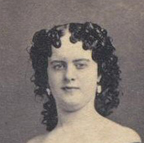
An Unknown Woman of Columbia: Could this be Martha?

Martha Carlos-Barclay-Hart
1833 - Martha was probably born in New Orleans, Louisiana or maybe Kentucky.
Unfortunately we have no history on her prior to coming to Columbia, California.
She is a difficult person to research as her information varies and yet her life in Tuolumne County is well documented.
1850s - At this time, only 300 women called San Francisco home, according to journalist Herbert Asbury in his 1933 "informal history" The Barbary Coast, "a third of which were harlots from Mexico, Peru, and Chili [sic]." The Pacific News printed a story in 1850 to announce the departure of 900 women "carefully chosen from the bagnios of Paris and Marseille," wrote Asbury, to be sent to San Francisco, yet somehow only 50 arrived. "It has been said," Asbury wrote, "that by the end of 1852, there was no country in the world that was not represented in San Francisco by at least one prostitute." ( Herbert Asbury in his 1933 "Informal History" The Barbary Coast)
1854 Her whole time in Tuolumne county Martha was a prostitute. To protect her family she most likely changed her name.
She was listed a white woman in all documents where that category was necessary. (census records, etc.)

A BUSINESS & PROPERTY OWNER.
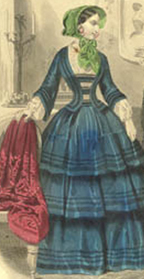
July 29, 1854 Martha Carlos bought land and the building from M. B. Brooks that was one lot south on the southwest corner of Jackson & Main Streets. (From deeds recorded)
(Leased later to Sam Mitchel in Oct. 1855)
The building is known as Martha's Saloon which was also called The Lone Star Saloon. "Martha's Saloon...has long been of ill fame, and Martha, the proprietress, of easy virtue." (Columbia Gazette Oct 12, 1855)
Martha also has a boarding house on the northeast corner of Columbia and Jackson Streets.
John W. Coffroth lived 100 feet from saloon.
August 1855 Martha..."went to Chinese Camp, taking with her the inmates of her house, and a business was opened there. While in Chinese Camp, she became enamored with Barclay, and the sentiment being duly returned, marriage followed!" (Columbia Gazette Oct 12, 1855)
June 6, 1856 - Martha Barclay bought land from Henry & Wife (Rosa?) Levy (From deeds recorded).
Oct. 27, 1856 - Martha Barclay sells saloon lot to Samuel Mitchel (From deeds recorded).

MARTHA MARRIES.
The book: "The Saga of Old Tuolumne" states: "A woman known as Martha, one of Big Anne's sisterhood, while leaving Columbia to go to Chinese Camp, met John Barclay, a claim owner, who was regarded favorably in the south western portion of the county. Upon gaining her promise to lead a respectable life, he married her. Barclay, a weak character, was by nature adverse to hard work and gave his wife but little assistance in carrying out her good intention. Married in Chinese Camp, the couple soon returned to Columbia and reopened the house known as Martha's Saloon, which prior to her romance had been making a great deal of money for her."
County register book shows: Barkley, (Barclay) J.S. married to Martha Carlos September 18th 1855 by J. A. Copwell in Columbia. Number 63.
Marriage record states,
"John S. Barkley(Barclay) to Martha Carlos
- Marriage -
This is to certify that on Friday the 18th
day of September AD 1855 at the house of
Martha Carlos in the town of Columbia
in the state of California I celebrated the
rites of Marriage between John S. Barkley
Esq. and Martha Carlos.
Given under my hand this 18th day
of September AD 1855.
(signed) J. A. Copwell
Justice of the Peace
Recorded September 15th AD 1856 at 9 AM."

THE INCIDENT.
1855 Oct. 10 - Murder of John Huron Smith and lynching of the murderer, John S. Barclay, in Columbia. (1850 census for Yurba Co. shows a John H. Smith, age 23, as a miner from Ohio.
1850 census for Eldorado Co. shows a John Barclay, age 28, no emlpoyment, from New Jersey.)
(from the History of Tuoumne County - 1882)
The year 1855 was prolific of exciting events, as these pages show; but among them all, perhaps, nothing more exciting took place during the year (with the possible excecution of the Heslep murder) than the murder in Columbia of J. H. Smith, of Knickerbocker Flat, and the summary lynching of his slayer, John S. Barclay.
At about half-past four o'clock on the afternoon of Wednesday, October 10, 1855, John H. Smith was shot dead by John S. Barclay, in the house on the corner of Main and Jackson streets, known as "Martha's Saloon." The house was of ill-fame, and Martha, the proprietress, of easy virtue. A few weeks before the murder occurred, she had, while on a business visit to Chinese Camp, there met and become enamored of young Barclay, and the sentiment being returned by him, marriage followed. Then returning to Columbia, the saloon was re-opened by the pair. Smith, a well-regarded sort of man, said to have been affianced to a young lady resident of Columbia, having been drinking on that fateful day, though usually a rather temperate man, became embroiled in a quarrel with Martha, in consequence of having broken a pitcher. High words following, Barclay came to the rescue of his wife and shot Smith dead in the melee. Almost instantly the man was arrested, taken to the town lock-up and there placed in confinement.
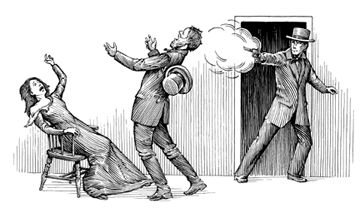
©Artwork by Larry Baumgardner.
John Barclay shooting John Smith at Martha's Place - 1855
Soon the people gathered, and in a very short time a large and excited mob surrounded the jail. J. W. Coffroth, Esq., addressed the assemblage, stating that ordinarily he was in favor of sustaining the laws, but that the occurrence was of a character to demand the speediest vengeance, and to warrant the people in taking the execution of the law into their own hands, and to mete out justice upon the spot; that the deceased held him as a very near and dear friend. He then passed an encomium upon the departed, and expressed a hope that the people would move, and that promptly. He had been elected, he said, to make laws, but upon this occasion he advised to lay them aside.
Upon his conclusion a rush was made upon the jail, then held by Town Marshal Carder and a few police officers, who attempted to keep the mob back, but were speedily disarmed and hurried aside by their assailants. At this junction, Mr. Heckendorn, the editor (so-called) of the Columbia Clipper, was, by acclamation, appointed Judge; another person was made Marshal, and a jury of twelve men was nominated. These preliminaries being concluded, a second rush was made upon the jail, and a keg of powder was placed in position to blow the iron doors open, but fortunately it was not used. Crowbars, sledge-hammers and axes were applied instead, and the doors gave way. Simultaneously with their opening, the prisoner sprang out as if to make his escape by running; but he was instantly borne downby numbers and carried by the excited mass up-town, amidst cries, oaths and imprecations.
Finally, after one or two brief halts, the crowd arrived at the flume of the Tuolumne County Water Company, on the road to Gold Springs (North of Columbia, near Jackson Square). A ring was formed and "Judge" Heckendorn took charge of the proceedings.
Mr. Coffroth was appointed prosecuting attorney, and John Oxley (Assemblyman from Tuolumne) counsel for the prisoner, and a jury was called, consisting of James McLean, Charles Williams, George Woodbury, Daniel Willcombe, A. H, Leavitt, John Douglas, John Bostwick, G. Lumsdell, T. Walls, Joseph Hussey and J. B. Plank. After much discussion, the question was put, "Shall the jury be sworn?" and it was decided in the affirmative, and hearing the evidence began. Marshal, Briggs, Alexander and Keyes, witnesses for "The People," testified in substance that Smith, slightly drunk (Gazette states; "drinking rather freely. Witness/friend E.B. Briggs stated that "Smith was rather tight." and that was a few dinks before Martha's), was making preparations for starting homeward, he residing at Knickerbocker Flat;
that while making a farewell round of visits to the saloons, he entered Martha's place along with the four witnesses mentioned, and accidentally or intentionally knocked a pitcher off the counter, or bar, when the mistress of the place appeared and demanded to know who did it. Little was evolved save that, getting in a dispute with her, Smith seized and threw her into a chair. At this juncture Barclay appeared from the next room, and seeing the situation of affairs, drew his revolver and instantly fired, with fatal effect.
As the examination progressed it was not hard to see that the prisoner's fate was determined on, and that he was beyond human help. Witnesses who it was supposed would testify in his behalf, were not allowed within the ring, and even his advocate was interrupted and his voice drowned. Mr. Coffroth, on the contrary, was allowed full swing for his denunciatory speeches, and seemed to have everything his own way from the first; naturally, too, for at this time he was the political idol of the ruling party. His remarks to the jury were about in this style: "Gentlemen, I have but little to say. You all knew the deceased, and knew that he was honest, good and high-minded. You have all heard the testimony and know the witnesses; they have lived long among you. The prisoner, I have testified, had a good character; but I am not here to plead his character. The only question to ask is, who is the murdered man, who the murderer? If you are satisfied that the prisoner shot Smith, then it is your duty to declare it, and it is your duty to declare the penalty. * * * There is a higher Court to ask for mercy. This man should fulfill he Divine Law of 'An eye for an eye, a tooth for a tooth, a life for a life.' 'Whosoever sheddeth man's blood, by man shall his blood be shed.' [Applause.] Gentlemen will please avoid any applause for the poor remarks I may offer. Consider the feelings of the prisoner. Who can estimate his anguish when he thinks upon the ignominious death that now awaits him?"
The prisoner, who had been sitting upon the ground with his hands over his face, now looked up and besought Mr. Coffroth to request of the jury a little time in which he might arrange his private affairs. Mr. Oxley, appearing for the prisoner, said: "I shall be brief. Consider well, gentlemen, what you are about to do. Let to-morrow bear favorably upon the acts of this night. [Confusion, and much noise; cries of "Enough!" "Enough!"] Will you not sustain the laws? Will it not be better that the just laws of our land should take their course? [Cries of "No!" "No!" "Up with him!" "Damn the laws!"] Let him be confined in jail. Consider your course, and the great responsibility that you assume. Give time for reflection. Let calmness have time to come in. Do not, after you have taken this man's life, find that it is too late to do justice. I do not say that the prisoner is entirely innocent, but that there are many extenuating circumstances. [Cries of "Short!" "Short!" "Enough!"] I expect to be short. I ask that the law may take its course. Let the prisoner have time, and let a proper investigation be had. Let time be granted. Let daylight be had for a fair trial. [Cries of "No!" "No!" "Hang him!" etc.]
Judge - "Hear Mr. Oxley." ["Enough!" "Enough!" "Drag him up!" "Damn him; he gave Smith no time!" "Hell shall not save him!"|
Oxley. - "I shall not stop. I shall do my duty as becomes a man. If the jury tell me to stop, I will, but not otherwise. Act calmly, gentlemen."
Here, loud cries stopped the speaker. Mr. Oxley pleaded earnestly and manfully, and in a way to win the lasting respect of even those men, who were so impatient to imbrue their hands in a fellow creature's blood; but uselessly, for, forced down by the multitude, he retired amid oaths and imprecations.
The case was now given to the jury, and they were asked to retire and consult. At this moment Sheriff Stuart arrived. Roaching the ground, he dismounted quietly, and walked around the outside of the ring to the vicinity of the prisoner, and, laying his hand upon him, demanded him in the name of the law and for the law. Some one immediately seized Stuart by the throat, while others rudely laid hold of him, throwing him back violently. With shouts of "The Sheriff!" "The Sheriff!" the crowd rushed forward, bearing Barclay and the officer far apart. The latter demanded to be released, and to be supported in the discharge of his duty; but at first in vain. Getting free some minutes after, he rushed towards the prisoner, who was then under the flume with a rope around his neck. Calling for a knife, and securing one, he made ineffectual endeavors to cut the rope, but while so engaged he received a heavy blow on the head from the butt of a pistol, while others laid violent hands upon him, tearing his clothes, bruising his face, and disarming him. Barely was his life preserved, and that only through the presence of mind of a solitary friend, who, at the risk of his own safety, clutched
a bowie-knife aimed at the Sheriff's body.
The miserable prisoner, haltered by the rope suspended from the flume above, was drawn up by his executioners overhead, ascending with a savage yell from the multitude. No precautions had been taken to pinion the victim, and he, reaching upward, seized with desperate grip the rope, above his head, and held on with the force given by the fear of death. To break his hold, those above drew him up and let him down suddenly several times, but still his powerful grasp held good. One of the executioners, leaning over the flume, called out, "Let go, you fool, let go!" Finally his strength gave out; the hands fell to his sides. Drawing up his legs, he gave a few convulsive movements, and then hung straight. All was over, for body and soul had parted.
The spectacle was well said to be truly horrifying: a human form, hanging by the neck, in mid air; a vast throng of men, shouting, yelling and jumping; while the red and lurid glare of torches and bonfires sent a horrid flash upon the terrible scene. Of the two individuals who lost their lives so tragically on that day, John H. Smith was said to have come from New York, but whose parents resided in Philadelphia, where they were highly respectable people. He was an open-hearted, generous man, much esteemed by his acquaintances, and when free from liquor, was a quiet, peaceable and friendly citizen.
John S. Barclay was also from New York, where his mother and sisters resided. He had lived at Chinese Camp from the year 1850, and was highly regarded there. He was possessed of some means, and owned a good claim there. But in an evil hour he met the frail Martha, and, falling in love with her, married her, upon her promises of leading a new and better life. He justified himself for the killing of Smith, upon the grounds that he had a right to defend his wife from his attacks. Nor does this seem an extraordinary assumption at all.
To arrive at an understanding of how this matter was regarded at the time, the following quotations from the (Columbia) Gazette are reproduced, written as they were by one who certainly manifested no fear of mobs, on this or any other occasion:
"We are not, we never have been, and never will be, the advocates of mob law, under any form, or for any end whatever. We live in a community of law; we have courts, law officers, and all the well established appliances of justice. We sustain them; all good men should do so, or there is no safety for any one. We ask any man who looked on calmly. (if any could do so), what chance any one stood for justice with the throng of Wednesday? No reply is needed from us. The particulars that we give, speak for themselves. The District Court, under a good Judge, opens next Monday; the Sheriff was on the ground; the witnesses all live in Columbia; and justice was not ten days off; but the mob could not wait. We deeply, sincerely regret to give these details; it pains us to record these occurrences as having taken place in Columbia, and we would gladly omit them; but our duty as journalists compels us to publish them; they are a blot upon our town. We trust in heaven that this may be the last time we shall have to perform so disagreeable a task; and we congratulate all those who have had no participation in these lamentable occurrences."
These are earnest, manly words — words uttered in defiance of the will and power of a mob whose numbers included a whole city; words that do not sound like the truckling, lickspittle froth that at similar times has disgraced the mouths of speakers and the pages of journalism.

THE HANGING.
October 10, 1855 - John S. Barclay shoots John H. Smith for pushing his wife Martha in her Saloon and Coffee House. John W. Coffroth helps the mob make a verdict of death by "Going Up the Flume." Barclay is hung.
(From the Columbia Gazette) The unfortunate Barclay was haltered, by a rope lowered from the flume, and those above hauled away upon it; and as he went up, a savage yell from the infuriated multitude rent the air, - while here and there, good men shook their heads, and mourned that such things could be. No precautions were taken to pinion the victim, and he seized hold of the rope above his head, and held on to it with a grasp of desperation. Those above, raised him up suddenly and jerked him down, several times, but still the grasp of desperation held good. One of the executioners looked over the edge of the flume, and cried out, "Let go, you damned fool, let go!" - Finally, his strength gave out; one hand fell and then the other; drawing up his legs, he gave a few convulsive movements, and then hung strait; all was over; body and soul had parted.

SHE WRITES A CARD.
The Card: A Notice to the Public.
(Taken verbatim from the Columbia Gazette, November 17th, 1855)
Since the death of my husband, I have endeavored to keep, as it were, secluded from the world. I have molested no one, but have tried to bear patiently and calmly the insults which have been heaped upon me, by some of the public journals of the State; the most malicious and vilifying of which have emanated from the Columbia Clipper, its editor (Columbia Clipper {May 13, 1854 to May 1857} under John Heckendorn) and the (so called) Hon.[Honorable] J. W. Coffroth.
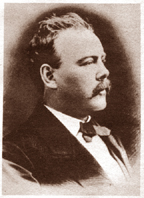
James Wood Coffroth c1860.
I am truly sorry that I am compelled to bring myself before the public, now, particularly, as my position in society is such, that anything coming from me is not likely to be received with an impartial eye. But my duty to the public and myself, renders it imperatively necessary for me to defend myself from the malicious assaults of said Coffroth, whose lying, oily pen has been used with such good effect in endeavoring to defend himself from the just and righteous censures of the public and the public press.
It is not so long ago, but Coffroth's memory will trace him back to the time when I kept a house, and he was a frequent visitor; nay, I should say, a steady boarder. But facts are stubborn things, and Coffroth would much rather not have me revert to the fact that he was the fancy man of one Sally who lived at my house; that often times I have kept my house open until one and two o'clock at night, for his especial benefit; and that not unfrequent were the occasions when back doors and windows were found to me of material service, when front ones were closed; that often even at that late hour of night, oyster suppers were served for the Hon. Gentleman and his lady - and let me ask him who paid the bills, and whether one cent ever came out of his pocket? No! He was the recipient of many favors from a poor and wretched girl whose mother has often written her, imploring her to return home. Those letters Coffroth has read; and while others subscribed different sums in order to enable her to return to the arms of a broken hearted mother, Coffroth was not even the man to advise her to go home. He well knew that he would be too much the loser. He also forgets that whenever Sally left my house, on his account, he would come to me with tears in his eyes, and beg me to get her back again; and how often, when he would go out to ride with ladies of respectability, who knew not how contaminating he was, he would call me aside, and beg me to keep Sally from calling and speaking to him, while in the company of those ladies. He also forgets, that while laboring under the influence of a most loathsome disease, he went to San Francisco, leaving his lady here to starve, or die upon my hands. But Coffroth has a hold upon the worm, and now let him feel its bite.
What was his remark to me, when on the night of the murder of my husband, I fell upon my knees before him, and implored him to use his influence to save him, until daylight? Unmoved by my cries, uninfluenced by my supplications, he coldly remarked: "Oh! There is no disguising it; he has got to die." To this remark a woman, who accompanied me, replied; "Oh Jim Coffroth, how can you speak to her in that way at this time?" But he turned away, and was soon in the midst of the multitude, making a mob law speech. But I believe it is customary, in this country, for persons living in glass houses to throw stones; and Coffroth, Heckendorn, and many who were leaders in that mob, and who were frequent visitors at my house, often stood at the bar drinking with inmates, and staying there all night when they had money, or could run on shape - Heckendorn could not do it, for I never knew him to have a cent.
In conclusion, I trust the public will pardon me for bringing myself before them. Judge Lynch, the people' coluntary attorney, and their organ have endeavored to place themselves in a false position, in order to secure themselves from the just censure of the world; and have endeavored to sink me lower than the vilest reptile that crawls from the earth. This card from me would be superfluous in the town of Columbia; their characters are too well known to need comments or exposure but throughout the State, where they are not so well known, and where they have tried to degrade me, even worse than I am, this true statement may not prove the fact that from the day I married Barclay until his death, I have never kept an open house; did not even have liquors in my decanters on the bar; and these facts were all known to the parties in question. For the truth of the above statements, I refer the reader to Coffroth's most intimate friends.
MARTHA J. BARCLAY
Columbia, November 17th, 1855

CENSUS REPORTS HER PROFESSION.
Deeds recorded:
1860 June 12th - Martha Barkley(sic), age 28 years, white race, Prostitute, $1510.00 in property value, $500.00 in personal value, her state of birth is listed as "do" (same as ditto) from the above listing of KY (Kentucky).

MARTHA REMARRIES.
1863 May 4th - James H. Hart marries Martha M. Barclay by James Staford, Justice of the Peace.

SHE OWNED MORE PROPERTY.
Deeds recorded:
1861 - Martha owns adobe building at Main and Pacific.
1862 - Martha owns brick house and lot at Main and Pacific.
June 30th, 1863 - Martha & J. H. Hart buy property from H. P. Barber on Main and Pacific Streets.
March 19th, 1870 - Martha Hart buys property from Rosa Cartier for $75.00 in Sonora.
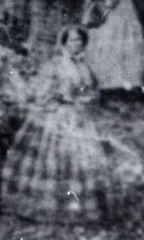
Woman in the "mines" of Columbia below wheel, 1866

MARTHA DIES.
July 8, 1876 Martha Hart of New Orleans, died at 43 (48?) years of age of "general debility".
Oct. 27th, 1876 - Martha J. Hart's estate is sold off.
Grave Number 416 is where she is buried with another's name on the marker....
The tombstone or actual spot in the City Cemetery in Sonora is missing or unknown.

This page is created for the benefit of the public by
Floyd D. P. Øydegaard

Email contact:
fdpoyde3 (at) Yahoo (dot) com
A WORK IN PROGRESS,
created for the visitors to the Columbia State Historic park.
© Columbia State Historic Park & Floyd D. P. Øydegaard.




















